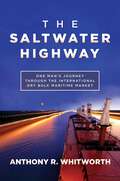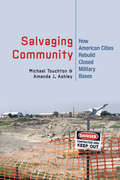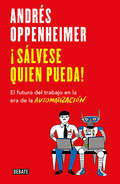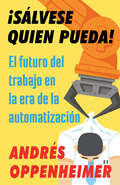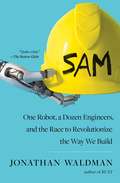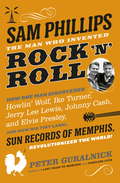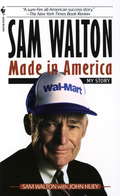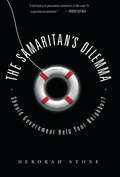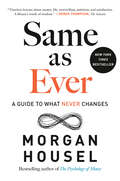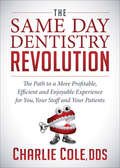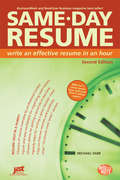- Table View
- List View
Salt Harbor: Confidential Information for Easterly
by Michael A. WheelerTwo-party negotiation involving a bed and breakfast and an incoming coffee chain.
Salt Lake Organizing Committee: 2002 Olympics
by Courtney Purrington H. Kent Bowen Bryce C. LapierreAfter two and a half years of effort, Fraser Bullock, COO of the 2002 Winter Olympics, faced projected deficits and post-9/11 security requirements only five months before the opening ceremony. Summarizes the organizational structure and processes put in place by Bullock and CEO Mitt Romney, as well as how they created systems and culture to endow effective working knowledge to the 90% of their staff who started working two weeks before the games began.
Salt Sugar Fat
by Michael Moss#1 NEW YORK TIMES BESTSELLERFrom a Pulitzer Prize-winning investigative reporter at The New York Times comes the explosive story of the rise of the processed food industry and its link to the emerging obesity epidemic. Michael Moss reveals how companies use salt, sugar, and fat to addict us and, more important, how we can fight back. In the spring of 1999 the heads of the world's largest processed food companies--from Coca-Cola to Nabisco--gathered at Pillsbury headquarters in Minneapolis for a secret meeting. On the agenda: the emerging epidemic of obesity, and what to do about it. Increasingly, the salt-, sugar-, and fat-laden foods these companies produced were being linked to obesity, and a concerned Kraft executive took the stage to issue a warning: There would be a day of reckoning unless changes were made. This executive then launched into a damning PowerPoint presentation--114 slides in all--making the case that processed food companies could not afford to sit by, idle, as children grew sick and class-action lawyers lurked. To deny the problem, he said, is to court disaster. When he was done, the most powerful person in the room--the CEO of General Mills--stood up to speak, clearly annoyed. And by the time he sat down, the meeting was over. Since that day, with the industry in pursuit of its win-at-all-costs strategy, the situation has only grown more dire. Every year, the average American eats thirty-three pounds of cheese (triple what we ate in 1970) and seventy pounds of sugar (about twenty-two teaspoons a day). We ingest 8,500 milligrams of salt a day, double the recommended amount, and almost none of that comes from the shakers on our table. It comes from processed food. It's no wonder, then, that one in three adults, and one in five kids, is clinically obese. It's no wonder that twenty-six million Americans have diabetes, the processed food industry in the U.S. accounts for $1 trillion a year in sales, and the total economic cost of this health crisis is approaching $300 billion a year. In Salt Sugar Fat, Pulitzer Prize-winning investigative reporter Michael Moss shows how we got here. Featuring examples from some of the most recognizable (and profitable) companies and brands of the last half century--including Kraft, Coca-Cola, Lunchables, Kellogg, Nestlé, Oreos, Cargill, Capri Sun, and many more--Moss's explosive, empowering narrative is grounded in meticulous, often eye-opening research. Moss takes us inside the labs where food scientists use cutting-edge technology to calculate the "bliss point" of sugary beverages or enhance the "mouthfeel" of fat by manipulating its chemical structure. He unearths marketing campaigns designed--in a technique adapted from tobacco companies--to redirect concerns about the health risks of their products: Dial back on one ingredient, pump up the other two, and tout the new line as "fat-free" or "low-salt." He talks to concerned executives who confess that they could never produce truly healthy alternatives to their products even if serious regulation became a reality. Simply put: The industry itself would cease to exist without salt, sugar, and fat. Just as millions of "heavy users"--as the companies refer to their most ardent customers--are addicted to this seductive trio, so too are the companies that peddle them. You will never look at a nutrition label the same way again."As a feat of reporting and a public service, Salt Sugar Fat is a remarkable accomplishment."--The New York Times Book ReviewFrom the Hardcover edition.
Salt Sugar Fat: How the Food Giants Hooked Us
by Michael MossFrom a Pulitzer Prize-winning investigative reporter at The New York Times comes the explosive story of the rise of the processed food industry and its link to the emerging obesity epidemic. Michael Moss reveals how companies use salt, sugar, and fat to addict us and, more important, how we can fight back. In the spring of 1999 the heads of the world's largest processed food companies--from Coca-Cola to Nabisco--gathered at Pillsbury headquarters in Minneapolis for a secret meeting. On the agenda: the emerging epidemic of obesity, and what to do about it. Increasingly, the salt-, sugar-, and fat-laden foods these companies produced were being linked to obesity, and a concerned Kraft executive took the stage to issue a warning: There would be a day of reckoning unless changes were made. This executive then launched into a damning PowerPoint presentation--114 slides in all--making the case that processed food companies could not afford to sit by, idle, as children grew sick and class-action lawyers lurked. To deny the problem, he said, is to court disaster. When he was done, the most powerful person in the room--the CEO of General Mills--stood up to speak, clearly annoyed. And by the time he sat down, the meeting was over. Since that day, with the industry in pursuit of its win-at-all-costs strategy, the situation has only grown more dire. Every year, the average American eats thirty-three pounds of cheese (triple what we ate in 1970) and seventy pounds of sugar (about twenty-two teaspoons a day). We ingest 8,500 milligrams of salt a day, double the recommended amount, and almost none of that comes from the shakers on our table. It comes from processed food. It's no wonder, then, that one in three adults, and one in five kids, is clinically obese. It's no wonder that twenty-six million Americans have diabetes, the processed food industry in the U.S. accounts for $1 trillion a year in sales, and the total economic cost of this health crisis is approaching $300 billion a year. In Salt Sugar Fat, Pulitzer Prize-winning investigative reporter Michael Moss shows how we got here. Featuring examples from some of the most recognizable (and profitable) companies and brands of the last half century--including Kraft, Coca-Cola, Lunchables, Kellogg, Nestlé, Oreos, Cargill, Capri Sun, and many more--Moss's explosive, empowering narrative is grounded in meticulous, often eye-opening research. Moss takes us inside the labs where food scientists use cutting-edge technology to calculate the "bliss point" of sugary beverages or enhance the "mouthfeel" of fat by manipulating its chemical structure. He unearths marketing campaigns designed--in a technique adapted from tobacco companies--to redirect concerns about the health risks of their products: Dial back on one ingredient, pump up the other two, and tout the new line as "fat-free" or "low-salt." He talks to concerned executives who confess that they could never produce truly healthy alternatives to their products even if serious regulation became a reality. Simply put: The industry itself would cease to exist without salt, sugar, and fat. Just as millions of "heavy users"--as the companies refer to their most ardent customers--are addicted to this seductive trio, so too are the companies that peddle them. You will never look at a nutrition label the same way again.From the Hardcover edition.
Salted and Cured: Savoring the Culture, Heritage, and Flavor of America's Preserved Meats
by Jeffrey RobertsFrom country ham to coppa, bacon to bresaola Prosciutto. Andouille. Country ham. The extraordinary rise in popularity of cured meats in recent years often overlooks the fact that the ancient practice of meat preservation through the use of salt, time, and smoke began as a survival technique. All over the world, various cultures developed ways to extend the viability of the hunt—and later the harvest—according to their unique climates and environments, resulting in the astonishing diversity of preserved meats that we celebrate and enjoy today everywhere from corner delis to white-tablecloth restaurants. In Salted and Cured, author Jeffrey P. Roberts traces the origins of today’s American charcuterie, salumi, and other delights, and connects them to a current renaissance that begins to rival those of artisan cheese and craft beer. In doing so, Roberts highlights the incredible stories of immigrant butchers, breeders, chefs, entrepreneurs, and other craftspeople who withstood the modern era’s push for bland, industrial food to produce not only delicious but culturally significant cured meats. By rejecting the industry-led push for “the other white meat” and reinvigorating the breeding and production of heritage hog breeds while finding novel ways to utilize the entire animal—snout to tail—today’s charcutiers and salumieri not only produce everything from country ham to violino di capra but create more sustainable businesses for farmers and chefs. Weaving together agriculture, animal welfare and health, food safety and science, economics, history, a deep sense of place, and amazing preserved foods, Salted and Cured is a literary feast, a celebration of both innovation and time-honored knowledge, and an expertly guided tour of America’s culinary treasures, both old and new.
The Saltwater Highway: One Man's Journey through the International Dry Bulk Maritime Market
by Anthony R. WhitworthA captivating and informative portrait of the business of maritime dry bulk shipping.According to the International Chamber of Shipping, a global trade organization representing 80 percent of the world&’s national shipowner organizations, 90 percent of world trade moves via the oceans—yet very few people know much about the maritime shipping industry. The Saltwater Highway aims to remedy that. Anthony Whitworth&’s travels and experiences throughout the world have given him a unique perspective on how goods move around the globe on the high seas. From the time he was a young voyage accountant in Fednav, one of Canada&’s largest maritime companies, Whitworth has been captivated by this fascinating, complex, multi-faceted industry. With close to five decades primarily in the dry bulk sector of global transport, Whitworth has seen the industry grow and change to meet the challenges of supplying the world with raw materials. From the great shipyards of Asia to the high-stakes finances of some of the largest corporations in the industry, to the ongoing efforts to combat climate change, The Saltwater Highway highlights Whitworth&’s career as it follows the evolution of modern maritime shipping. Based on personal experiences and an in-depth knowledge of how this invaluable trade works, travel along the Saltwater Highway to such far-flung places as the Arctic Circle, the upper regions of the River Plate, the shores of western Scotland, and various capital cities of the world including London, Moscow, and Beijing to meet some of the people who shaped this business and to discover how maritime transportation impacts our daily lives.
Salutogenious Growth – Wachstum der Zukunft: Mut zur intelligenten Ökonomie und die Magie der kreativen Empathie
by Raimund SchwendnerSalutogenious Growth setzt sich mit innovativen sowie zukunftsweisenden Formen des Wachstums auseinander. Daraus leitet es Instrumentarien und Prozesse zur nachhaltigen Transformation ab. Diese überträgt die Grundlagen der Salutogenese in wirtschaftliches Denken, also in die Frage, welche aktiven Prozesse ökonomische "Gesundheit" erzeugen, und verknüpft sie mit der "Ingeniosity". Die besticht durch Scharfsinn, Einfallsreichtum und Vorstellungskraft sowie durch kreative Empathie. Im Mittelpunkt stehen die "Leadership Maturity", der nachhaltige Turnaround des General Managements und die Entwicklung von "lernenden Kennzahlen". Die ordnen der Kauf- und Investitionskraft eine Problemlöse-Stärke zu, um eine langfristige Wertschöpfung zu erzielen. Das verbindet ökonomische, ökologisch verantwortliche und soziale Innovationen. Es bildet den Mantel für hochkarätige technologische Innovationen und für eine "hochbegabte" Künstliche Intelligenz. Diese vermag komplexe Risiken zügig zu erkennen, ihnen vorzubeugen und sie zu "überholen". So profitiert der Homo oeconomicus von der besonderen Klugheit des Homo sapiens-sapiens. Daraus entstehen neuartige Formen der Personal- und Organisationsentwicklung und insbesondere der zukunftsfähigen Persönlichkeitsentwicklung.
Salvage from the Sea (Routledge Revivals)
by Gerald ForsbergSalvage from the Sea (1977) offers a fascinating insight into the interesting but complex and highly specialised profession of marine salvage and its associated disciplines. All aspects of the wide and varies field of marine salvage are covered and discussed in detail.
Salvage Your Super: Money-Making Strategies for Financing your Future -- at any age
by Geoff PeckThe recent stock market crash saw a staggering $200 billion wiped off superannuation balances. Fortunately, you can do something about it. Salvage Your Super is a comprehensive guide to making the most of your super and retirement assets, regardless of your age or income. It offers sound advice on what to do with your super depending on your financial profile, and provides tangible solutions to help retirees reverse the recent downtreand in their funds without selling the farm. Inside you'll discover: how to calculate how much you will need in retirement to live the life you want age-specific tactics (whether you're in your 20s, 30s, 40s, 50s or 60s, or you're post-retirement) to get your super back on track accessible, easy-to-implement strategies that are appropriate for both now and the future how to maximize your returns and minimise fees and tax. So don't just sit back and wait for things to get better -- read this book and salvage your super!
Salvaging Community: How American Cities Rebuild Closed Military Bases
by Michael Touchton Amanda J. AshleyAmerican communities face serious challenges when military bases close. But affected municipalities and metro regions are not doomed. Taking a long-term, flexible, and incremental approach, Michael Touchton and Amanda J. Ashley make strong recommendations for collaborative models of governance that can improve defense conversion dramatically and ensure benefits, even for low-resource municipalities. Communities can't control their economic situation or geographic location, but, as Salvaging Community shows, communities can control how they govern conversion processes geared toward redevelopment and reinvention.In Salvaging Community, Touchton and Ashley undertake a comprehensive evaluation of how such communities redevelop former bases following the Department of Defense's Base Realignment and Closure (BRAC) process. To do so, they developed the first national database on military redevelopment and combine quantitative national analyses with three, in-depth case studies in California. Salvaging Community thus fills the void in knowledge surrounding redevelopment of bases and the disparate outcomes that affect communities after BRAC. The data presented in Salvaging Community points toward effective strategies for collaborative governance that address the present-day needs of municipal officials, economic development agencies, and non-profit organizations working in post-BRAC communities. Defense conversion is not just about jobs or economic rebound, Touchton and Ashley argue. Emphasizing inclusion and sustainability in redevelopment promotes rejuvenated communities and creates places where people want to live. As localities and regions deal with the legacy of the post-Cold War base closings and anticipate new closures in the future, Salvaging Community presents a timely and constructive approach to both economic and community development at the close of the military-industrial era.
¡Sálvese quien pueda!: El futuro del trabajo en la era de la automatización
by Andrés OppenheimerEl 47% de los empleos será reemplazado por robots o computadoras inteligentes. ¿Quién está preparado? Con una prosa vibrante y lúcida, Andrés Oppenheimer encara un fenómeno que transformará radicalmente la sociedad: es probable que, en las próximas dos décadas, casi la mitad de los trabajos sea reemplazada por computadoras con inteligencia artificial. Abogados, contadores, médicos, comunicadores, vendedores, banqueros, maestros, obreros, restauranteros, analistas, choferes, meseros, trabajadores y estudiantes... tiemblen o prepárense. En su nueva obra, Oppenheimer -uno de los periodistas más importantes de Hispanoamérica, coganador del premio Pulitzer- detalla qué y cómo ocurrirá, a qué ritmo y qué países sufrirán más por el golpe. Y tal vez lo más importante: gracias a su investigación, realizada por tres continentes, logra explicar qué puede hacer cada uno de nosotros ante el terremoto que se acerca y enlista cuáles son los trabajos que, esos sí, tienen futuro.
¡Sálvese quien pueda!: El futuro del trabajo en la era de la automatización
by Andres OppenheimerManteniéndose fiel a su característico estilo periodístico, Andrés Oppenheimer lleva a sus lectores en un nuevo viaje, esta vez a través del mundo, con la intención de comprender cuál será el futuro de los trabajos de hoy en el día, mientras se aproxima lo que muchos han denominado como la era de la automatización. Tal como lo indican dos de los entrevistados de Oppenheimer -ambos expertos en tecnología y economía de la Universidad de Oxford- el cuarenta y siete por ciento de los trabajos existentes corren el riesgo de automatizarse o volverse obsoletos debido a los avances tecnológicos y el crecimiento de los productos y servicios en línea que están por venir en los próximos veinte años. Oppenheimer conversa con expertos en sus campos y examina los cambios que ya comienzan a desarrollarse en varias áreas de empleo, incluyendo en la industria de alimentos, en el mundo legal, en la banca y en la medicina. Oppenheimer contrapone también las perspectivas de los "tecno-optimistas" con las de los "tecno-negativistas" e intenta encontrar un término medio entre una visión alarmista del futuro y una que es demasiado acrítica. Autodenominado un "optimista cauteloso", Oppenheimer opina que la tecnología no necesariamente creará un desempleo masivo, sino más bien cambiará drásticamente la definición de lo que hoy conocemos como un "empleo".
¡Sálvese quien pueda!
by Andrés OppenheimerManteniéndose fiel a su característico estilo periodístico, Andrés Oppenheimer lleva a sus lectores en un nuevo viaje, esta vez a través del mundo, con la intención de comprender cuál será el futuro de los trabajos de hoy en el día, mientras se aproxima lo que muchos han denominado como la era de la automatización. Tal como lo indican dos de los entrevistados de Oppenheimer -ambos expertos en tecnología y economía de la Universidad de Oxford- el cuarenta y siete por ciento de los trabajos existentes corren el riesgo de automatizarse o volverse obsoletos debido a los avances tecnológicos y el crecimiento de los productos y servicios en línea que están por venir en los próximos veinte años. Oppenheimer conversa con expertos en sus campos y examina los cambios que ya comienzan a desarrollarse en varias áreas de empleo, incluyendo en la industria de alimentos, en el mundo legal, en la banca y en la medicina. Oppenheimer contrapone también las perspectivas de los "tecno-optimistas" con las de los "tecno-negativistas" e intenta encontrar un término medio entre una visión alarmista del futuro y una que es demasiado acrítica. Autodenominado un "optimista cauteloso", Oppenheimer opina que la tecnología no necesariamente creará un desempleo masivo, sino más bien cambiará drásticamente la definición de lo que hoy conocemos como un "empleo".
SAM: One Robot, a Dozen Engineers, and the Race to Revolutionize the Way We Build
by Jonathan WaldmanA true story of innovation that &“reads like a movie&” (Seth Godin), centered on a scrappy team of engineers—far from the Silicon Valley limelight—and their quest to revolutionize the traditional trade of masonry by building a robot that can lay bricks.Humans have landed men on the moon, programmed cars to drive themselves, and put the knowledge of our entire civilization in your back pocket. But no one—from MIT nerds to Army Corps engineers—has ever built a robot that can lay bricks as well as a mason. Unlike the controlled conditions of a factory line, where robots are now ubiquitous, no two construction sites are alike, and a day&’s work involves countless variables—bricks that range in size and quality, temperamental mortar mixes, uneven terrain, fickle weather, and moody foremen. Twenty-five years ago, on a challenging construction job in Syracuse, architect Nate Podkaminer had a vision of a future full of efficient, automated machines that freed bricklayers from the repetitive, toilsome burden of lifting, in bricks, the equivalent of a Ford truck every few days. Offhandedly, he mentioned the idea to his daughter&’s boyfriend, and after some inspired scheming, the architect and engineer—soon to be in-laws—cofounded a humble start-up called Construction Robotics. Working out of a small trailer, they recruited a boldly unconventional team of engineers to build the Semi-Automated Mason: SAM. In classic American tradition, a small, unlikely, and eccentric family-run start-up sought to reimagine the behemoth $1 trillion construction industry—the second biggest industry in America—in bootstrap fashion. In the tradition of Tracy Kidder&’s The Soul of a New Machine, SAM unfolds as an engineering drama, full of trials and setbacks, heated showdowns between meticulous scientists and brash bricklayers (and their even more opinionated union), and hard-earned milestone achievements. Jonathan Waldman, acclaimed author of Rust, masterfully &“reveals a world that surrounds us but mostly eludes our notice&” (The Boston Globe).
Sam Barnstable and Blue Sky Radio Devices
by Ann Leamon G. Felda HardymonThese three short vignettes depict investment professionals considering difficult financings for companies in their portfolios. For one reason or another, each company has under-performed expectations. Should the protagonist recommend that the firm participate or not, or should he try to revise it? Can the firm exercise any influence, and are the potential gains worth the time and effort that will be required?
Sam Phillips: The Man Who Invented Rock 'n' Roll
by Peter GuralnickRock 'n' roll was born in rural Alabama, 1923, in the form of Sam Phillips, the youngest son of a large family living in a remote colony called the Lovelace Community. His father had a gift for farming, which was brought to an end by the Depression. His mother picked guitar and showed the kind of forbearance that allowed her to name her son after the doctor who delivered him drunk and then had to be put to bed himself. And yet from these unprepossessing origins, in 1951 Phillips made what is widely considered to be the first rock 'n' roll record, Ike Turner and Jackie Brenston's 'Rocket 88'. Just two years later a shy eighteen-year-old kid with sideburns, fresh out of high school, wandered into his recording studio to make a record 'for his mother', secretly hoping that it might somehow get him noticed. His name was Elvis Presley. Elvis's success, and the subsequent triumph of rock 'n' roll, was initially propelled to an almost astonishing degree by a limited number of releases by Carl 'Blue Suede Shoes' Perkins, Johnny Cash and Jerry Lee Lewis - all from this tiny, one-man label. An engaging mix of biography and anecdote, Peter Guralnick's book brilliantly recreates one shining moment in the history of popular culture. And Sam Phillips was the man who brought it all about.
Sam Walton
by Sam Walton John HueyMeet a genuine American folk hero cut from the homespun cloth of America's heartland: Sam Walton, who parlayed a single dime store in a hardscrabble cotton town into Wal-Mart, the largest retailer in the world. The undisputed merchant king of the late twentieth century, Sam never lost the common touch. Here, finally, inimitable words. Genuinely modest, but always sure if his ambitions and achievements. Sam shares his thinking in a candid, straight-from-the-shoulder style. In a story rich with anecdotes and the "rules of the road" of both Main Street and Wall Street, Sam Walton chronicles the inspiration, heart, and optimism that propelled him to lasso the American Dream.
The Samaritan's Dilemma: Should Government Help Your Neighbor?
by Deborah StonePolitics has become a synonym for all that is dirty, corrupt, dishonest, compromising, and wrong. For many people, politics seems not only remote from their daily lives but abhorrent to their personal values. Outside of the rare inspirational politician or social movement, politics is a wasteland of apathy and disinterest. It wasn't always this way. For Americans who came of age shortly after World War II, politics was a field of dreams. Democracy promised to cure the world's ills. But starting in the late seventies, conservative economists promoted self-interest as the source of all good, and their view became public policy. Government's main role was no longer to help people, but to get out of the way of personal ambition. Politics turned mean and citizens turned away. In this moving and powerful blend of political essay and reportage, award-winning political scientist Deborah Stone argues that democracy depends on altruism, not self-interest. The merchants of self-interest have divorced us from what we know in our pores: we care about other people and go out of our way to help them. Altruism is such a robust motive that we commonly lie, cheat, steal, and break laws to do right by others. "After 3:30, you're a private citizen," one home health aide told Stone, explaining why she was willing to risk her job to care for a man the government wanted to cut off from Medicare. The Samaritan's Dilemma calls on us to restore the public sphere as a place where citizens can fulfill their moral aspirations. If government helps the neighbors, citizens will once again want to help govern. With unforgettable stories of how real people think and feel when they practice kindness, Stone shows that everyday altruism is the premier school for citizenship. Helping others shows people their common humanity and their power to make a difference. At a time when millions of citizens ache to put the Bush and Reagan era behind us and feel proud of their government, Deborah Stone offers an enormously hopeful vision of politics.
Same Approach--Other Teachers: Teaching Adaptive Leadership
by Sharon D. ParksThis chapter introduces several other teachers who have successfully adopted the case-in-point approach and describes how it is modified and evolves when transferred into different contexts, such as other institutions, executive coaching, professional consulting, undergraduate leadership development, and other cultures.
Same as Ever: A Guide to What Never Changes
by Morgan Housel&“Want to understand the changing world? Start with what stays the same. That&’s the amazing conclusion of Morgan Housel&’s fascinating, useful, and highly-entertaining book.&” — Arthur C. Brooks, Professor, Harvard Kennedy School and Harvard Business School, and #1 New York Times bestselling authorFrom the author of the international blockbuster, THE PSYCHOLOGY OF MONEY, a powerful new tool to unlock one of life&’s most challenging puzzles.Every investment plan under the sun is, at best, an informed speculation of what may happen in the future, based on a systematic extrapolation from the known past.Same as Ever reverses the process, inviting us to identify the many things that never, ever change.With his usual elan, Morgan Housel presents a master class on optimizing risk, seizing opportunity, and living your best life. Through a sequence of engaging stories and pithy examples, he shows how we can use our newfound grasp of the unchanging to see around corners, not by squinting harder through the uncertain landscape of the future, but by looking backwards, being more broad-sighted, and focusing instead on what is permanently true. By doing so, we may better anticipate the big stuff, and achieve the greatest success, not merely financial comforts, but most importantly, a life well lived.
The Same Day Dentistry Revolution: The Path to a More Profitable, Efficient and Enjoyable Experience for You, Your Staff and Your Patients
by Charlie ColeThe current model of practicing dentistry is like a bad tooth in sore need of extraction. In The Same Day Dentistry, Charles Cole D.D.S. shows us the path to a better way of practicing dentistry – one that gives patients solutions the same day rather than “someday.” It also shows how one dentist’s personal journey can translate to a rewarding career for anyone willing to read, be true to themselves, and take a leap.
Same-Day Resume
by Michael FarrThis compact guide gives the reader the essential tools to apply for jobs on the fly. Also includes advice on cover letters, JIST Cards, thank-you notes, online resumes, and job search strategies.
Same-Sex Affairs: Constructing and Controlling Homosexuality in the Pacific Northwest
by Peter BoagPeter Boag draws on police logs, court records, and newspaper accounts to create a vivid picture of the lives of the men and youths representing male same-sex sexual subcultures--their sexual practices, cultural networks, cross-class relations, variations in rural and urban experiences, and ethnic and racial influences.




